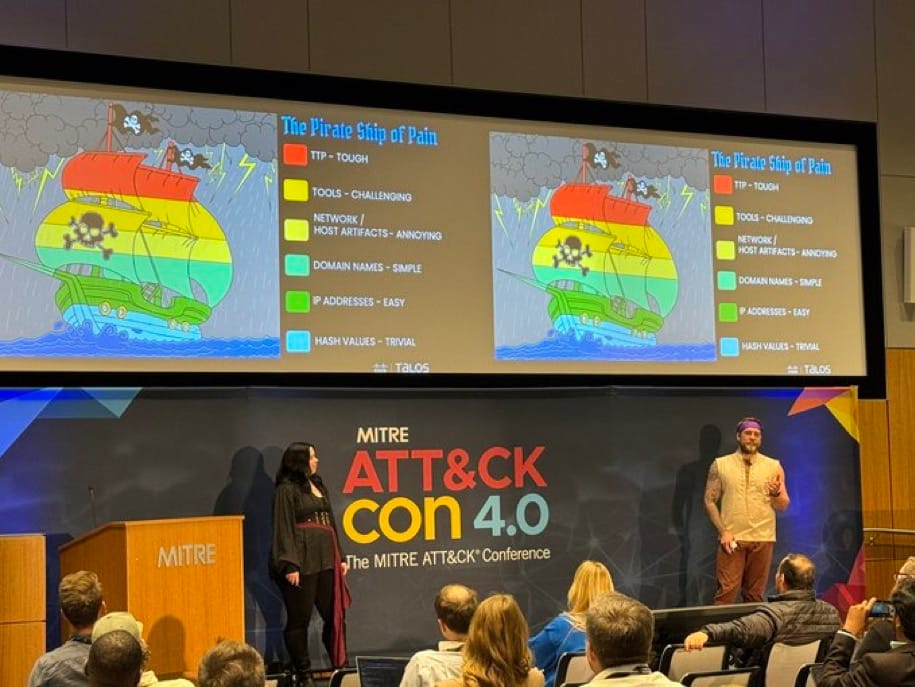If state-sponsored actors are after one thing, it’s to spread fear and uncertainty across the internet.
There’s always money to be made targeting individual businesses and organizations, but for James Nutland’s work, it’s always about the bigger picture. And his background in studying counterterrorism and interpersonal social dynamics provides him a unique perspective on APTs’ goals and methods.
Nutland, an analyst with Cisco Talos’ Threat Intelligence and Interdiction team, didn’t begin his journey into cybersecurity through the traditional pathways. Instead, he went to college to obtain his bachelor’s degree in social psychology, particularly interested in social engineering, eventually obtaining his master’s in counterterrorism from the University of East London.
That may sound like a degree someone gets to serve on a physical battlefield, but as Nutland puts it, security research and counterterrorism carry some of the same throughlines.
“It’s providing you a set of skills you can then use in multiple modalities,” he said. “It’s the analysis, the eagerness to delve into the unknown, to assess swathes of noisy information, picking out the pieces to establish different threads to try and establish patterns and hopefully attribution — it’s that kind of analytical investigative thinking that really helps for threat hunting.”

Nutland’s technical experience comes from his undergraduate days when he started working in tech support for his college. Eventually, he got into system administration work after he moved to the U.S. during the peak of the COVID-19 pandemic.
After various roles protecting both business and academic environments, Nutland decided to apply to Talos essentially on a whim after seeing a job listing whilst researching IOCs on the Talos intelligence center. In his current role, he conducts regular threat hunting and analysis campaigns to learn more about broader trends in the security landscape and state-sponsored threat actors. His work recently led to the disclosure of a campaign targeting Mexico users with tax-themed lure documents called “TimbreStealer,” and he participates in Cisco Talos Incident Response’s Intel-on-Demand service.
Nutland says he goes into every engagement or new project with a completely open mind and a blank slate — using his background investigating terror operations to find out as much as he can about a particular adversary’s operation.
“With my academic background, I’m very inquisitive. That’s proven to be a good asset,” he said. “I have a good understanding of the content and presentation of intelligence sought after in security management and operations. It’s great providing this intelligence, but providing actionable intelligence for security teams, understanding what’s required for that, it’s integral for many of the products we produce.”
Recently, Nutland says he’s been focusing more on tracking prominent and burgeoning ransomware threat actors, as well as researching dark web activities where threat actors are leveraging obfuscated channels for their communication. Social media sites have gotten better about blocking this type of activity, he said, which has pushed them to decentralized communication platforms. He’s also tracking dark web sites that are used for obtaining ransom payments, spreading propaganda and trying to radicalize other users.
Nutland’s work has also been crucial in Talos’ support of Ukraine during Russia’s invasion. He worked on several victim notifications for the Ukraine Task Force and discovered the malicious use of a defense evasion tool, which can wipe traces and logs of any USB devices that may have been connected to hardware and certain user activity on the host.
“I initially saw a suspicious specific set of commands that were being run related to the executable, that I was able to track across multiple potential Ukrainian victims which Ukrainian organizations are now looking to crack down on,” Nutland said.
In all his roles so far in his career, Nutland said he’s experienced various forms of imposter syndrome throughout his career, as many do. He said he often found himself questioning decisions, or feeling like other teammates were more qualified for his role. But at Talos, his managers have encouraged him to turn over every rock and go into every situation, curious and open. That’s allowed him to overcome that imposter syndrome and become a sponge, learning everything he could about a particular topic and becoming an expert in his own right.
This culminated in a presentation to more than 300 people at the MITRE ATT&CKcon 4.0 in October, where he and his teammate, Nicole Hoffman, gave a talk about how threat actors can use the ATT&CK framework to track adversary activity.
“Here are these titans of threat intelligence at a world-renowned convention. And here’s me, recently employed at Talos, and with incredible imposter syndrome,” Nutland said. “But there were about 300 people in the room, and Nicole and I knocked it out of the park. I never thought I’d be doing that.”
Outside of the office, Nutland enjoys playing rugby, and he even was recently able to play a scrimmage against the Colombian National Team, a particular highlight for his career outside of cybersecurity.